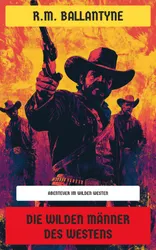In R. M. Ballantyne's adventurous novel, "Martin Rattler," readers are thrust into a vivid narrative that chronicles the exploits of a young boy named Martin as he navigates the wilderness of South America. Richly illustrated with Ballantyne's characteristic attention to detail, the story unfolds through a blend of action and moral lessons, echoing the Victorian fascination with exploration, civilization versus savagery, and the resilience of the human spirit. The novel's lively prose is interspersed with the educational fervor typical of early children's literature, engaging young readers while invoking themes of bravery, friendship, and the indomitable will to survive in a treacherous environment. R. M. Ballantyne, a Scottish writer celebrated for his adventure tales aimed at children, was deeply influenced by his own experiences as a young man living in Canada and his early maritime escapades. His background in the Scottish literary tradition and his commitment to educating youth through engaging narrative equipped him with a distinctive voice. "Martin Rattler" exemplifies his insights into human nature and the intricacies of the natural world, as well as the era's growing interest in imperialism and exploration. I highly recommend "Martin Rattler" not only to young adventurers seeking thrilling escapades but also to educators and parents who wish to cultivate a love for reading and moral reflection in their children. Ballantyne's storytelling serves as both a captivating adventure and a thoughtful exploration of personal growth, ensuring its relevance for generations of readers.

Away in the Wilderness
R.M Ballantyne
book
La Gran Aventura del Verano – 20 Aventuras de Piratas, Tesoros Ocultos y Islas Misteriosas
Robert Louis Stevenson, Julio Verne, Herman Melville, Henry De Vere Stacpoole, Daniel Defoe, Joseph Conrad, Alexandre Dumas, Rafael Sabatini, Emilio Salgari, Frederick Marryat, Walter Scott, James Fenimore Cooper, R.M Ballantyne, Randall Parrish, James Norman Hall
book
La isla de coral : Una travesía de descubrimiento y amistad en la naturaleza salvaje de una isla llena de aventuras y desafíos
R.M Ballantyne
book
Die wilden Männer des Westens : Abenteuer im wilden Westen
R.M Ballantyne
book
Die Koralleninsel : Abenteuerroman
R.M Ballantyne
book
WILD WEST Boxed Set: 150+ Western Classics in One Volume : Unparalleled Exploration of the American West Through Classic Western Narratives
Mark Twain, James Fenimore Cooper, Max Brand, James Oliver Curwood, B.M. Bower, Zane Grey, Jackson Gregory, Jack London, Emerson Hough, Will Lillibridge, Andy Adams, Bret Harte, Owen Wister, Washington Irving, Willa Cather, O.Henry, Grace Livingston Hill, Charles King, Charles Alden Seltzer, Stephen Crane, Dane Coolidge, Marah Ellis Ryan, Francis William Sullivan, Frederic Homer Balch, Frederic Remington, Robert W. Chambers, Forrestine C. Hooker, Frank H. Spearman, J. Allan Dunn, Ann S. Stephens, Robert E. Howard, R.M Ballantyne, Charles Siringo, Isabel E. Ostrander
book
60 WESTERNS: Cowboy Adventures, Yukon & Oregon Trail Tales, Famous Outlaws, Gold Rush Adventures : Tales of Cowboys, Outlaws, and Gold Rush Adventures
Mark Twain, James Fenimore Cooper, Max Brand, James Oliver Curwood, B.M. Bower, Zane Grey, Jackson Gregory, Jack London, Emerson Hough, Will Lillibridge, Andy Adams, Bret Harte, Owen Wister, Washington Irving, Willa Cather, O.Henry, Grace Livingston Hill, Charles Alden Seltzer, Stephen Crane, Dane Coolidge, Marah Ellis Ryan, Frederic Homer Balch, Frederic Remington, Robert W. Chambers, Forrestine C. Hooker, Frank H. Spearman, J. Allan Dunn, Robert E. Howard, R.M Ballantyne, Charles Siringo
book
Dead Men Tell No Tales - 60+ Pirate Novels, Treasure-Hunt Tales & Sea Adventure Classics : A Swashbuckling Voyage Through Time and Legend
Jules Verne, Charles Dickens, Robert Louis Stevenson, James Fenimore Cooper, Edgar Allan Poe, William Hope Hodgson, Howard Pyle, Jack London, Arthur Conan Doyle, Richard Le Gallienne, Daniel Defoe, Alexandre Dumas, Charles Ellms, Frederick Marryat, Harold MacGrath, Joseph Lewis French, Harry Collingwood, Stanley Lane-Poole, Charles Boardman Hawes, L. Frank Baum, J.M. Barrie, R.M Ballantyne, G. A Henty, J. D. Jerrold Kelley, J. Allan Dunn, Robert E. Howard, F. Scott Fitzgerald, Sir Walter Scott, Ralph D. Paine, Captain Charles Johnson, W. H. G. G Kingston, Currey E. Hamilton, John Esquemeling
book
THE BOOK OF PIRATES: 70+ Adventure Classics, Legends & True History of the Notorious Buccaneers : Tales of High Seas Adventure: Legends, Classics & History of the Notorious Buccaneers
Jules Verne, Charles Dickens, Robert Louis Stevenson, James Fenimore Cooper, Edgar Allan Poe, William Hope Hodgson, Howard Pyle, Jack London, Arthur Conan Doyle, Richard Le Gallienne, Walter Scott, Daniel Defoe, Alexandre Dumas, Charles Ellms, Frederick Marryat, Harold MacGrath, Joseph Lewis French, Harry Collingwood, Stanley Lane-Poole, Charles Boardman Hawes, L. Frank Baum, J.M. Barrie, R.M Ballantyne, G. A Henty, J. D. Jerrold Kelley, J. Allan Dunn, Robert E. Howard, F. Scott Fitzgerald, Ralph D. Paine, Captain Charles Johnson, W. H. G. G Kingston, Currey E. Hamilton, John Esquemeling
book
150 Western Classics : Stories of Adventure, Courage, and Justice in the American West
Mark Twain, James Fenimore Cooper, Max Brand, James Oliver Curwood, B.M. Bower, Zane Grey, Jackson Gregory, Jack London, Emerson Hough, Will Lillibridge, Andy Adams, Bret Harte, Owen Wister, Washington Irving, Willa Cather, O.Henry, Grace Livingston Hill, Charles King, Charles Alden Seltzer, Stephen Crane, Dane Coolidge, Marah Ellis Ryan, Francis William Sullivan, Frederic Homer Balch, Frederic Remington, Robert W. Chambers, Forrestine C. Hooker, Frank H. Spearman, J. Allan Dunn, Ann S. Stephens, Robert E. Howard, R.M Ballantyne, Charles Siringo, Isabel E. Ostrander
book
The Men Who Shot Liberty: 60 Rip-Roaring Westerns in One Edition : Cowboy Adventures, Yukon & Oregon Trail Tales, Gold Rush Adventures: Riders of the Purple Sage…
Mark Twain, James Fenimore Cooper, Max Brand, James Oliver Curwood, B.M. Bower, Zane Grey, Jackson Gregory, Jack London, Emerson Hough, Will Lillibridge, Andy Adams, Bret Harte, Owen Wister, Washington Irving, Willa Cather, O.Henry, Grace Livingston Hill, Charles Alden Seltzer, Stephen Crane, Dane Coolidge, Marah Ellis Ryan, Frederic Homer Balch, Frederic Remington, Robert W. Chambers, Forrestine C. Hooker, Frank H. Spearman, J. Allan Dunn, Robert E. Howard, R.M Ballantyne, Charles Siringo
book
The Outlaws of the Wild West: 150+ Westerns in One Edition : Cowboy Adventures, Yukon & Oregon Trail Tales, Famous Outlaw Classics, Gold Rush Adventures & more
Mark Twain, James Fenimore Cooper, Max Brand, James Oliver Curwood, B.M. Bower, Zane Grey, Jackson Gregory, Jack London, Emerson Hough, Will Lillibridge, Andy Adams, Bret Harte, Owen Wister, Washington Irving, Willa Cather, O.Henry, Grace Livingston Hill, Charles King, Charles Alden Seltzer, Stephen Crane, Dane Coolidge, Marah Ellis Ryan, Francis William Sullivan, Frederic Homer Balch, Frederic Remington, Robert W. Chambers, Forrestine C. Hooker, Frank H. Spearman, J. Allan Dunn, Ann S. Stephens, Robert E. Howard, R.M Ballantyne, Charles Siringo, Isabel E. Ostrander
book
